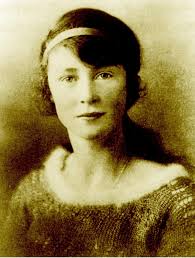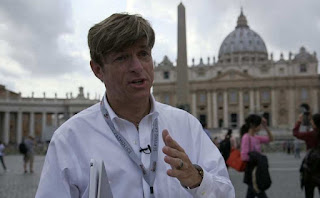The reading from the Apocalypse is one of my favourite readings of the liturgical year, too:
After this I had a vision of a great multitude, which no one could count, from every nation, race, people, and tongue. They stood before the throne and before the Lamb, wearing white robes and holding palm branches in their hands. They cried out in a loud voice: "Salvation comes from our God, who is seated on the throne, and from the Lamb."
All the angels stood around the throne and around the elders and the four living creatures. They prostrated themselves before the throne, worshipped God, and exclaimed: "Amen. Blessing and glory, wisdom and thanksgiving, honor, power, and might be to our God forever and ever. Amen."
The Book of Apocalypse is a book that moves me, fascinates me, and inspires me more and more. The funny thing is that, although it may well be the book of the New Testament that unbelievers find the craziest, it's somehow the most convincing to me. It drags all the themes of Scripture together in a mighty, resounding crescendo.
I am also more and more fascinated by the saints. Perhaps more than anything else, the saints convince me of the truth of Catholicism.
Our Lord spoke of 'the narrow gate'. Narrowness might seem uninspiring, but increasingly I find the 'narrowness' of sanctity enormously inspiring.
Humans have a spectacular knack for going wrong. When I look back on my life and thoughts, I can say with no false humility that I was wrong about everything. Even when I was right, I was wrong.
This human capacity for going wrong strikes me especially when it comes to political, social, literary and cultural debates-- debates which interest me less and less. Critics of Catholicism find its dogmas restricting, but Catholics themselves know how much error and waywardness and confusion we manage to create even within those confines. Outside the Faith, it seems to me, there is utter anarchy. "Conservatism", "liberalism", "freedom", "humanity", "progress", "love", "nature"-- such words are essentially meaningless in the babble of fallen humanity. Two interpreters of some human philosopher or writer, both of whom think themselves utter rigourists, can disagree completely.
With the saints, it is different. The deeper you read into their lives, the more you recognise the same journey of holiness, the same supernatural instincts at work. It is uncanny.
 |
| G.K. Chesterton |
Once again, G.K. Chesterton said it best:
If you really want to know what we mean when we say that Christianity has a special power of virtue, I will tell you. The Church is the only thing on earth that can perpetuate a type of virtue and make it something more than a fashion. The thing is so plain and historical that I hardly think you will ever deny it. You cannot deny that it is perfectly possible that tomorrow morning, in Ireland or in Italy, there might appear a man not only as good but good in exactly the same way as St. Francis of Assisi. Very well, now take the other types of human virtue; many of them splendid. The English gentleman of Elizabeth was chivalrous and idealistic. But can you stand still here in this meadow and be an English gentleman of Elizabeth? The austere republican of the eighteenth century, with his stern patriotism and his simple life, was a fine fellow. But have you ever seen him? Have you ever seen an austere republican? Only a hundred years have passed and that volcano of revolutionary truth and valour is as cold as the mountains of the moon. And so it is and so it will be with the ethics which are buzzing down Fleet Street at this instant as I speak. What phrase would inspire the London clerk or workman just now? Perhaps that he is a son of the British Empire on which the sun never sets; perhaps that he is a prop of his Trades Union, or a class-conscious proletarian something or other; perhaps merely that he is a gentleman when he obviously is not. Those names and notions are all honourable; but how long will they last? Empires break; industrial conditions change; the suburbs will not last for ever. What will remain? I will tell you. The Catholic Saint will remain.
So here are my All Saints Day prayers.
First of all, I pray for my beloved Michelle, and the five immortal souls who never saw the light of day, whio I mentioned in a recent post.
Next, I pray that we will succeed in bringing life into this world. Reader, if you are ever praying for me, this is the prayer I would always ask. Because it is something so personal and private, I haven't really mentioned it, and it's not something I like to discuss. But nothing weighs on me more.
Next, I give a prayer of thanksgiving that my father is still in this world, at the grand old age of seventy-seven. I never dared hope he would be spared so long, and I am very thankful. May he see many more birthdays!
 |
| My father, Peadar Kelly |
I pray for my father-in-law Nick, who passed away this year.
I give a very heartfelt prayer of thanksgiving for all my blog readers, and for all their prayers. I can't tell you how much they've meant to me. I pray we all meet in Heaven, amongst the saints.
I pray that all our families, where they are not in communion with Holy Mother Church, will come into communion with her. Lord, give us the grace to light their way.
I pray for the Church itself, that the Holy Spirit guards it from heresy, cowardice and accommodation with the world.
I pray for all priests, and for vocations to the priesthood and religious life.
I pray to the saints that inspire me the most, amongst the great heavenly host:
My name-saint St. Sechnaill, about whom I wish I knew a lot more. My confirmation saint Finbarr, lover of learning.
 |
| St. Bernadette |
St. Bernadette Soubirous, whose simplicity and humility inspires me more and more, and whose photograph seems to me like an image of the beauty of holiness. Give me a deeper love of our Blessed Mother, St. Bernadette!
St. Gemma Galgani, who I've read a great deal about recently, and whose humility and ardour fills me with awe. ("Live, Jesus!" was her simple ejaculatory prayer.)
 |
| St. Gemma |
Blessed John Henry Newman, whose deep seriousness and manliness seems such a wonderful tonic for our trivial times.
St. Robert Southwell, whose love of Mary's Dowry (England) I find inspiring as a lifelong anglophile, and whose poem 'The Burning Babe' expresses the fieriness of our Faith better, perhaps, than any text outside Scripture.
 |
| St. Robert Southwell |
St. Josemaria Escriva, who enjoined us to make heroic verse out of the prose of our lives, and also showed us how to do so with his own life.
St. Patrick, whose utter dedication to the gospel and whose flame-like simplicity can be seen in his Confession, which I encourage everybody to read.
St. Maximillian Kolbe, whose apostolic daring seems to show that we can never ask enough of God.
Venerable Edel Quinn, who brought the faith of St. Patrick all over Africa, despite being almost at death's door.
 |
| Edel Quinn |
St. John Paul II, St. Pius X, and Blessed Pius IX; lions of orthodoxy, to whom untold millions must be indebted for so much as hearing the pure Gospel.
St. Stephen, the first martyr, whose example of fearless truth-telling we might cherish in this era of 'inter-religious dialogue'. (I originally added, rather impishly: "Whatever that might be." Then I thought better of it. St. John Paul II was committed to inter-religious dialogue, as was Pope Benedict XVI, so it's good enough for me. All the same, I can't help suspecting it has been taken too far, and has given out the wrong message to a world already infatuated with relativism.)
The greatest of all the saints, Our Blessed Lady. I've written on this blog about my 'mommy issues' when it comes to Mary. (St. Gemma used to address her simply as 'Mom'.) Well, I am very grateful that I have begun to develop a more Catholic relationship with our Mom. This, too, I can lay at the feet of the saints. The saints lead us to Mary, and Mary leads us to her Son.
And all the heavenly host, all our friends in Heaven, intercede for us, Amen! God bless us all on this All Saints Day!













